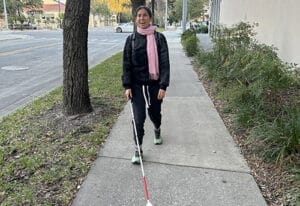
By Client Joanne Lax
We have plenty of laws in the United States protecting the rights of people with disabilities. The grand-daddy of them all is the landmark Americans with Disabilities Act, which since 1990 guarantees disabled individuals employment opportunities and access to everyday activities like shopping, going to the movies, eating at a restaurant, attending a concert or sporting event, among many others. This watershed legislation facilitated great strides forward for people with disabilities and is to be commended. What hasn’t made the same great strides forward, however, is the attitudes and behavior of John and Jane Q Public toward people with disabilities.
I can speak with considerable authority on this subject. I lost vision when I was in my late twenties. With the help of a very supportive husband and specialized rehabilitation counselors, I made it through the emotional trauma and learned how to adapt. It turns out that my approach to adapting mirrored the philosophy of the main character in the book A Gentleman in Moscow, which I read some 35 years later: “You must master your circumstances or your circumstances will master you.”
To be sure, some things dramatically changed for me. I need to receive information about the world using four senses rather than five, so some things that are obvious to sighted people aren’t obvious to me. And I need assistance navigating the environment—where’s the door I want, or the unoccupied chair, or the uneven pavement that intends to jump up and trip me, or the bicycle that is parked haphazardly across the sidewalk trying to block my path? Much of that navigation assistance comes from my guide dog—an amazing animal. Much of that assistance also comes from sighted humans, especially my husband.
But aside from these logistical challenges, I’m the same person now as I was when I could see. I have the same likes, dislikes, personality, aptitudes and faults. My experience has allowed me to witness firsthand the difference between how someone is treated when he or she is perceived as normal versus when he or she is perceived as disabled. The chasm is immense, and the landscape on the disability side isn’t always pretty.
Of course, I have an inner circle of friends, colleagues and relatives who totally get it and relate to me in exactly the way I hope everyone would. I am incredibly grateful for each and every one of them. Sadly, though, that’s not the case across the board. I will consider this blog post to be an immense success if I can heighten the awareness of even one as yet unenlightened reader about how to behave respectfully towards people with disabilities.
I’ll categorize the behaviors that I’d like to change into five groups. First there’s what I call the Invisibility Syndrome. Then there’s the Pedestal Effect. Closely followed by the Canine Tunnel Vision Phenomenon, the When it Benefits Me Approach, and finally the Unintended Consequences Principle. Here’s what I mean.
The Invisibility Syndrome occurs when someone disregards a disabled person entirely, as though they were invisible. Consider this example. My husband and I were in the lingerie department of a large store. We approached the sales counter because I wanted assistance in making my selection. The salesperson looked directly at my husband and asked him “What does she want?” Last I knew, my husband doesn’t wear ladies’ lingerie and had no idea what I wanted. I was both humiliated and embarrassed—as was he. Ditto when a waitress looked at him and asked “Does she want lemon with her iced tea?” All visually impaired people are perfectly capable of speaking for themselves, so please speak directly to us. The Invisibility Syndrome also manifests itself when officemates walked past without any greeting, as though basic civility didn’t apply for visually impaired people. Or when officemates didn’t stop at my office to extend an invitation when gathering an impromptu group to go to lunch or to have a happy hour cocktail. Visually impaired people want to be recognized and included just like sighted people do. So please extend visually impaired people the same courtesy and comradery as anyone else.
The Pedestal Effect falls on the opposite end of the spectrum. Sighted people will gush over how remarkable, admirable and inspiring it is that a visually impaired person can do everyday things—attend a concert, walk the track at the gym, cook a meal, even walk and chew gum at the same time. I know that these people all mean well. But I’m not amazing, awesome, inspirational, marvelous or whatever word you choose. I’m just a mere mortal doing normal things the best way I can. This kind of exaltation makes me uncomfortable. No pedestals are needed. Please accept a visually impaired person as just a normal, everyday human doing normal, everyday things, albeit with adaptations.
The Canine Tunnel Vision Phenomenon elevates my guide dog over me. I have had five terrific guide dogs, including my present beautiful 3-year-old black lab. I am more than happy to answer questions about the dog and to be a goodwill ambassador for Leader Dogs for the Blind. I owe her and the organization a tremendous debt of gratitude and am happy to pay it off any way I can. But that’s not all I want to talk about. The Canine Tunnel Vision Phenomenon assumes that my entire repertoire of conversation focuses on dogs—my dog, your dog, your cousin’s dog, the dog you saw on TV—on and on. Often people don’t know my name, but they remember my dog’s name. I’d love to engage you in much broader conversation. Please be willing to talk to a visually impaired person about anything and everything that you’d talk about with one of your sighted friends. We are multi-faceted people just like you.
The When it Benefits Me Approach is more insidious. Some businesses only pay lip service to the concept of non-discrimination until they decide that treating disabled people fairly has a payoff for them. Consider this example. A prominent entertainment venue in my geographic area does not have accessible seating at every ticket price point. It declined to give me a ticket for existing accessible seating in a different location for the price point I wanted. Instead it insisted that I could sit on an aisle in the balcony and let my guide dog sit on the steps alongside the rows of seats. Not a good idea, since it is obvious that this would create a trip hazard for patrons using the steps, particularly if someone needed to leave their seat after the performance started and the lights were dimmed. Not to mention that the dog would be uncomfortable straddling steps. At our fourth performance of the season, an usher recognized the unsafe situation, got a manager involved, and resolved the situation to everyone’s satisfaction by relocating my husband, me and my dog to seats on the main floor where my guide dog could comfortably and safely lie down. It took a real-time epiphany for the venue to do the right thing. By the way, the Americans with Disabilities Act requires entertainment venues to locate accessible seating in all sections, or to otherwise make them available at all price points. Wouldn’t it have been better for the venue to have assigned me appropriate seating from the get go—for its own risk management purposes and for customer relations, let alone legal compliance?
Finally, there’s the Unintended Consequences Principle. Well-meaning, even beneficial policies don’t always work out that way. The regional transit authority in my geographic area operates a door-to-door bus for seniors and people with disabilities. Yet it refused to let me enroll for that service (even though I am a senior) because of my guide dog. It insisted that I use its ADA bus—the transportation program specifically designed under the Americans with Disabilities Act. The problem? The enrollment process for the ADA bus was so long that I was unable to use the bus when I needed it. Obviously, a good program went awry here and turned into a discriminatory barrier instead of a benefit. The Americans with Disabilities Act prohibits the concept of “separate but equal,” which is what the transit authority essentially imposed. A dose of common sense and flexibility would have gone a long way toward providing meaningful service to a person with a disability.
In conclusion, we all should recognize that everyone is just one bad car accident or one bit of bad medical luck away from being a person with a disability. If that misfortune happened to you, you’d want people to interact with you exactly as they always have—as a whole person working hard to overcome a challenge. You wouldn’t want to be defined as just an impairment. Please, then, behave that way towards the people with disabilities that you may encounter in your daily life. There’s a reason why the Golden Rule is golden!
Meet client Joanne Lax and find out more about her background and connection to Leader Dog.



